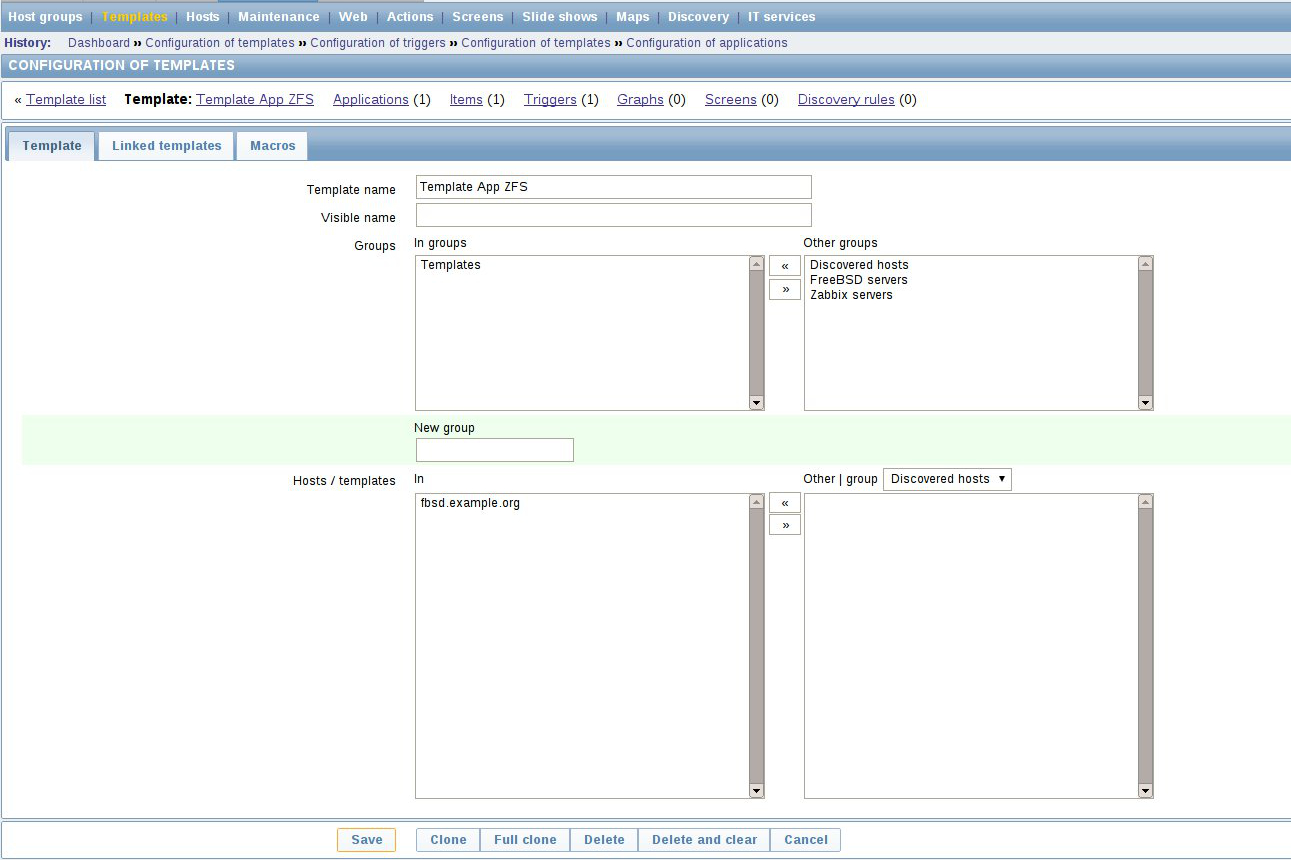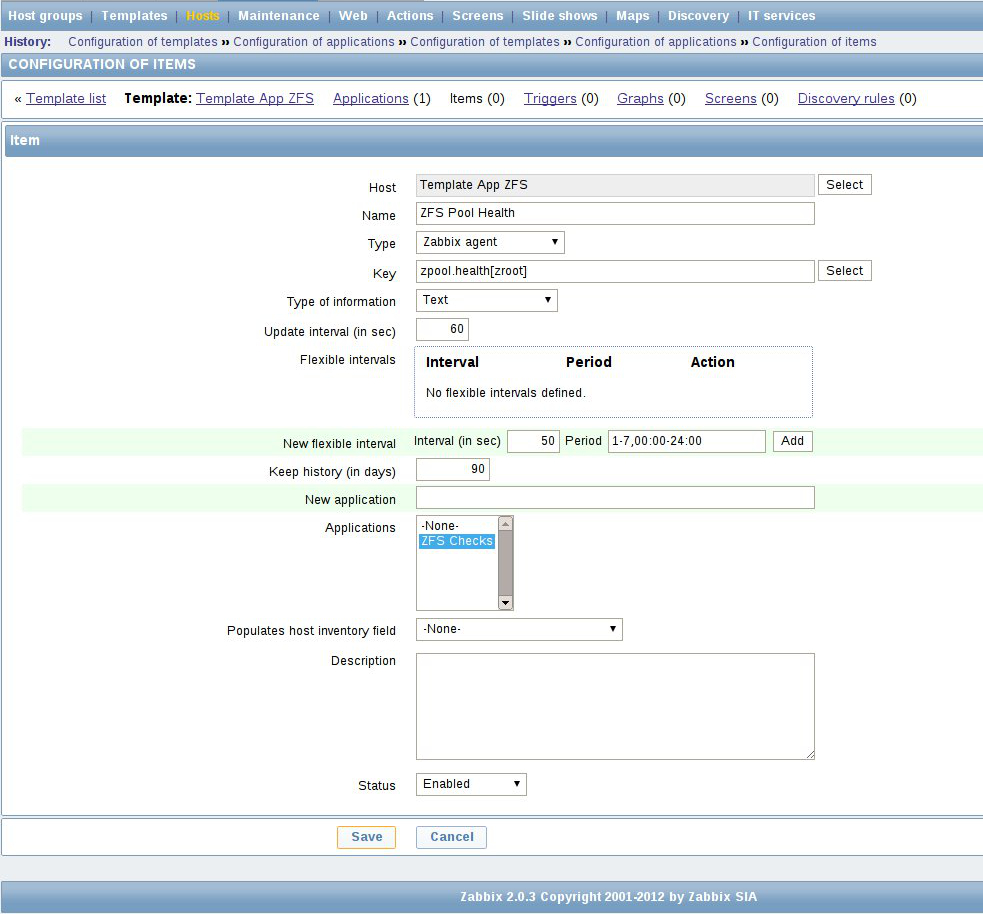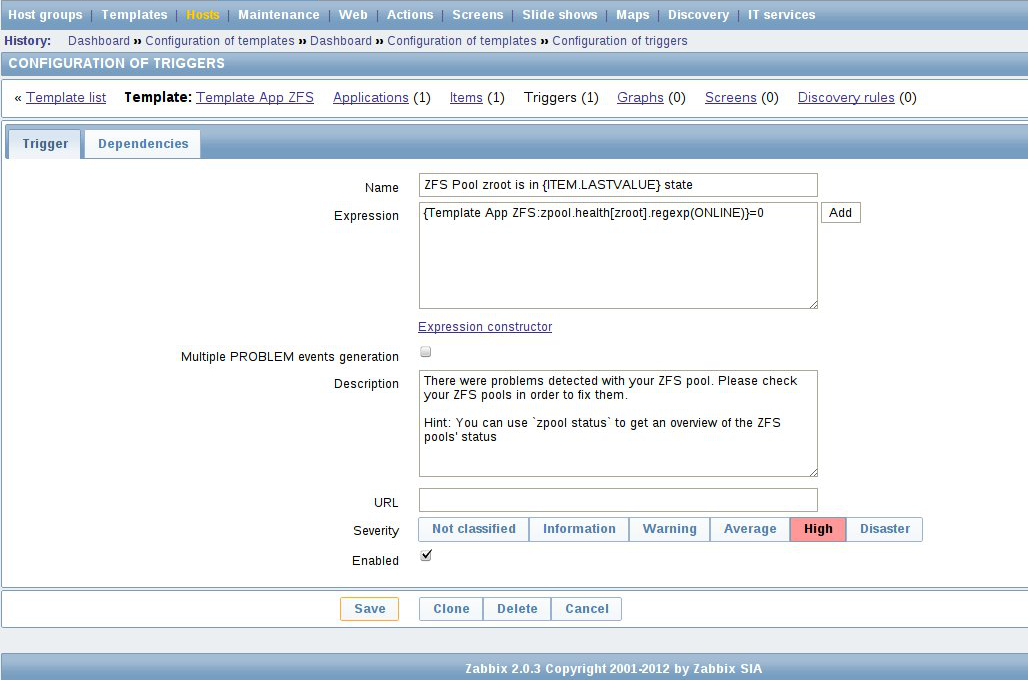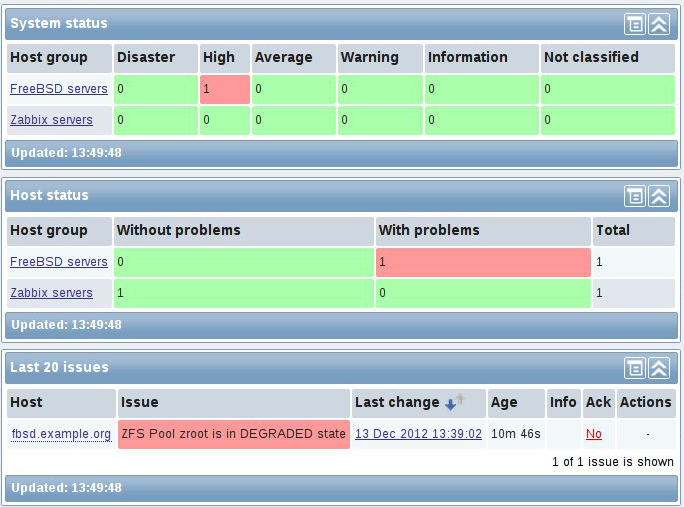Monitoring your ZFS pools in Zabbix
In this post we’ll see how we can setup Zabbix in order to monitor our ZFS pools.
For demonstration purposes I’ve setup a test virtual machine running FreeBSD 9.0 with a ZFS pool of two disks in a mirror. We will see how to monitor the ZFS pool’s health in Zabbix and trigger alarms in case we have some issues with our ZFS pools.
Basic understand and knowledge about Zabbix is required as well in order to better understand the material in this post.
First, lets see our ZFS pool:
% zpool status
pool: zroot
state: ONLINE
scan: none requested
config:
NAME STATE READ WRITE CKSUM
zroot ONLINE 0 0 0
mirror-0 ONLINE 0 0 0
ada0p2 ONLINE 0 0 0
ada1p2 ONLINE 0 0 0
errors: No known data errors
Okay, our ZFS pool is looking good. Now lets proceed with the Zabbix setup.
We are going to create a template for our ZFS pools in Zabbix, so later it would be easy to extend it and attach to existing systems.
First we need to add a new UserParamater to our Zabbix Agents, which will be used for polling information for our ZFS pools.
Create a new file under /usr/local/etc/zabbix2/zabbix_agentd.conf.d/zfs.conf (this assumes that your zabbix_agentd.conf file includes the /usr/local/etc/zabbix2/zabbix_agentd.conf.d/ directory).
The contents of the zfs.conf file are shown below:
UserParameter=zpool.health[*],zpool list -H -o health $1
Restart the Zabbix agent:
$ sudo service zabbix_agentd restart
Now we can continue with configuring our Zabbix checks. Login to your Zabbix server and navigate to Configuration -> Templates and then click on the Create template button.
Name your template Template App ZFS and click the save button as shown in the example screenshot below:
Next we create a new application in our template, which is called ZFS Checks:
Now we are going to create a new item that will be checking our ZFS pools, so go to the Items tab of your template and click the Create Item button.
On the screenshot below you can see the item we’ve created. As the key of our item we use the newly added UserParameter which is called zpool.health, the type of information should be set to Text. You may also note that we pass an argument to our key zpool.health[zroot], which specifies the ZFS pool’s name.
Now, it’s time to add a trigger for our item. Triggers are the way you fire up alarms in Zabbix. Here we are going to create a trigger that will go into alarm if our ZFS pool is no longer in online state. Now, navigate to the Triggers tab of your template and click on the Create button in order to create a new trigger.
You can see the trigger we’ve created on the screenshot below:
The trigger’s expression we use in the screenshot above is:
{Template App ZFS:zpool.health[zroot].regexp(ONLINE)}=0
What it basically does is that it will enable the trigger if our ZFS pool is no longer in ONLINE state, which means there’s something wrong with your pool - a disk failed or whatever.
The last thing you need to do is to attach your ZFS template to your systems, so that you can start monitoring your ZFS pools’ health. Checking the latest data of our test server we can see that our ZFS pool is online:
In order to show you how Zabbix detects problems with our ZFS pools, I am going to remove physically one of the disks on my test machine. You can see how Zabbix detected the issue right away from the screenshot below:
Checking on the server the status of our ZFS pool we can see that the zroot pool is indeed in degraded state:
% zpool status
pool: zroot
state: DEGRADED
status: One or more devices could not be opened. Sufficient replicas exist for
the pool to continue functioning in a degraded state.
action: Attach the missing device and online it using 'zpool online'.
see: http://www.sun.com/msg/ZFS-8000-2Q
scan: resilvered 15.9M in 0h0m with 0 errors on Thu Dec 13 13:16:53 2012
config:
NAME STATE READ WRITE CKSUM
zroot DEGRADED 0 0 0
mirror-0 DEGRADED 0 0 0
ada0p2 ONLINE 0 0 0
17609975337436690025 UNAVAIL 0 0 0 was /dev/ada1p2
errors: No known data errors
As you’ve seen from the screenshot above Zabbix has detected the issue with our ZFS pool and notified us, so that we can take an action for fixing the issues.





